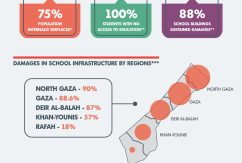EU NDICI Global Europe – Thematic Programme for Civil Society Organisations – Israel 2022-2023

The European Union’s Thematic Programme for Civil Society Organizations is a new programme funded through the Global Europe: Neighbourhood, Development and International Cooperation Instrument (NDICI). The overall objective of the programme is to strengthen civil society organisations (CSOs) as independent actors of good governance and development in their own right. The programme regards CSOs as key partners in devising and implementing policies and programmes that meet people’s needs; and envisions a more inclusive, empowered, and independent civil society that contributes to the attainment of human rights, the rule of law, accountability, democracy, peace and stability around the world. The programme is also fully in line with the 2012 EU Communication on Civil Society in External Relations.
The global objective of this call for proposals is to strengthen Israel’s Civil Society Organizations (CSOs) as independent actors of good governance and development at the national and local level.
The specific objective of this call for proposals is to strengthen the capacities of CSOs to engage in policy dialogue at the national and local level, by improving their ability to monitor the implementation of government decisions, programmes and legislation relating to human and social development in Israel.
Thematic priorities that constitute human and social development in Israel include, but are not limited to: Reduction of poverty and inequality, gender equality and the elimination of gender-based violence, economic development and employment, health, disability, climate and environment, democracy and good governance, the empowerment of youth, and more.
Local CSOs have an important role to play in ensuring that decisions and programmes designed to advance human and social development in Israel are adopted by the government and are successfully implemented. This role can include, inter alia, ensuring that such decisions and programmes are adequately budgeted,
backed by relevant legislation, and implemented on the ground effectively, with minimal negative unintended consequences.
Often, CSOs that play such a monitoring role vis a vis the government become better positioned to enter into policy dialogue with the latter. As they develop expertise in specific thematic areas, consolidate information and begin to offer quality insights, government stakeholders are more likely to see them as valuable stakeholders and/or partners. CSOs then have a better chance to identify and raise attention to potential risks and actual failures and negative consequences in government programming – not just post hoc but also during the implementation of decisions and programmes.
Over the years, the government of Israel has adopted various decisions and programmes designed to advance human and social development in the country. These include decisions in areas such as gender equality and the elimination of gender-based violence, reduction of poverty and inequality, economic development and employment, health, disability, climate and environmental protection, and more. The government of Israel is also committed to working toward achieving the UN Sustainable Development Goals (SDGs) and has made some important steps in this direction in recent years. In all of these fields, local CSOs can potentially play a vital role in ensuring that the government actually achieves its objectives and fulfills its own commitments to the public.
To realize this potential, CSOs must develop expertise in specific thematic areas and build their own capacity to monitor government programming. This capacity necessitates a good understanding of processes and procedures at the level of the Knesset and the government, and just as important – at the level of Local Authorities. It also requires an ability to consolidate information and produce valuable insights in a timely manner, which could then be communicated to relevant stakeholders.
Unfortunately, this requires resources many CSOs currently lack, especially smaller grassroots organizations representing marginalized communities in the social or geographic periphery. Furthermore, CSOs often face various barriers to obtaining quality information on the implementation of government decisions and programmes, such as a lack of transparency and accessibility of public information.
This Call for Proposals was designed to help change this reality. It seeks to support CSOs that wish to invest in developing their ability to monitor government decisions, programmes and legislation. It also seeks to support the training of CSOs on monitoring, research, analysis, and advocacy, with an eye toward improving their capacity to monitor the development and implementation of government initiatives. Finally, it seeks to support the development of new/innovative tools, including digital tools, to make information on government initiatives to advance human and social development more open and accessible and hence easier to monitor. By supporting such actions, the Call for Proposals aims to help CSOs in Israel realize their potential to become independent actors of good governance and development at the national and local levels.
Other Opportunities



































